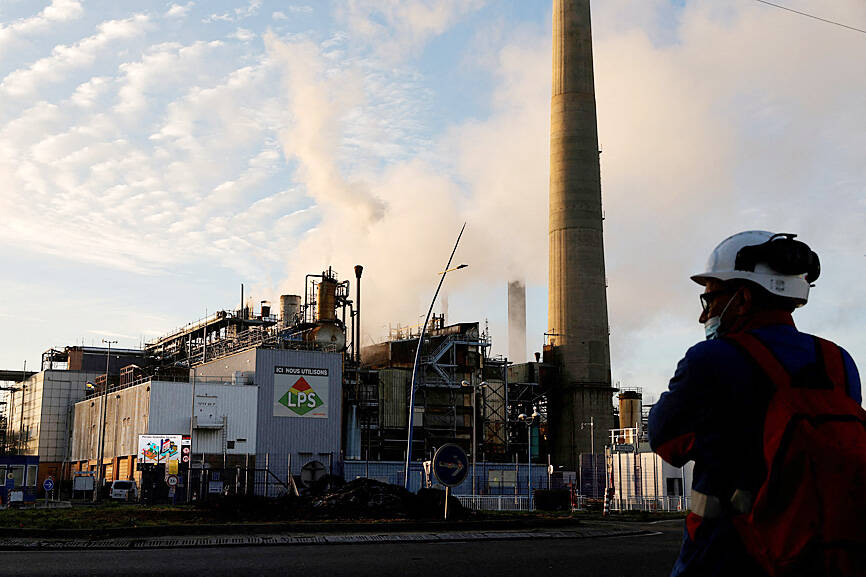Oil dropped the most in a week since April as the full weight of languishing Chinese demand and more economic tightening radically shifted the market’s sentiment.
West Texas Intermediate for December delivery fell 1.91 percent to US$80.08 a barrel. US futures fell 9.98 percent this week, the most since US President Joe Biden ordered a historic discharge of crude from the US’ Strategic Petroleum Reserve in April.
Brent crude for December delivery dropped 2.41 percent to US$87.62 a barrel, down 8.72 percent from a week earlier.

Photo: Reuters
Swelling COVID-19 cases in China and aggressive monetary tightening by central banks have combined to erase all the gains earned last month when OPEC and its partners slashed production by 2 million barrels a day.
Pullbacks were evident along most of the oil-trading complex. On Friday, the US prompt-spread flipped into contango, a structure that signals oversupply, for the first time since last year.
Meanwhile, a deteriorating market for physical barrels has also weighed on prices, as demand for winter delivery cargoes has weakened.
The collapsing gauges of market health sent bulls running for the exits. Hedge funds slashed bullish bets for Brent crude the most in four months.
Money managers’ net long positions on the international benchmark fell about 30,000 contracts, data from the US Commodity Futures Trading Commission showed on Friday
Crude is trading below several key moving averages, sparking technical-based selling. A further collapse in the market’s structure on Friday added to the selling.
Coronavirus cases in China have climbed to near their highest level during the COVID-19 pandemic. The increases is likely to prove a test for any loosening of the country’s disease prevention rules.
Additional reporting by staff writer

The US dollar was trading at NT$29.7 at 10am today on the Taipei Foreign Exchange, as the New Taiwan dollar gained NT$1.364 from the previous close last week. The NT dollar continued to rise today, after surging 3.07 percent on Friday. After opening at NT$30.91, the NT dollar gained more than NT$1 in just 15 minutes, briefly passing the NT$30 mark. Before the US Department of the Treasury's semi-annual currency report came out, expectations that the NT dollar would keep rising were already building. The NT dollar on Friday closed at NT$31.064, up by NT$0.953 — a 3.07 percent single-day gain. Today,

‘SHORT TERM’: The local currency would likely remain strong in the near term, driven by anticipated US trade pressure, capital inflows and expectations of a US Fed rate cut The US dollar is expected to fall below NT$30 in the near term, as traders anticipate increased pressure from Washington for Taiwan to allow the New Taiwan dollar to appreciate, Cathay United Bank (國泰世華銀行) chief economist Lin Chi-chao (林啟超) said. Following a sharp drop in the greenback against the NT dollar on Friday, Lin told the Central News Agency that the local currency is likely to remain strong in the short term, driven in part by market psychology surrounding anticipated US policy pressure. On Friday, the US dollar fell NT$0.953, or 3.07 percent, closing at NT$31.064 — its lowest level since Jan.

Hong Kong authorities ramped up sales of the local dollar as the greenback’s slide threatened the foreign-exchange peg. The Hong Kong Monetary Authority (HKMA) sold a record HK$60.5 billion (US$7.8 billion) of the city’s currency, according to an alert sent on its Bloomberg page yesterday in Asia, after it tested the upper end of its trading band. That added to the HK$56.1 billion of sales versus the greenback since Friday. The rapid intervention signals efforts from the city’s authorities to limit the local currency’s moves within its HK$7.75 to HK$7.85 per US dollar trading band. Heavy sales of the local dollar by

The Financial Supervisory Commission (FSC) yesterday met with some of the nation’s largest insurance companies as a skyrocketing New Taiwan dollar piles pressure on their hundreds of billions of dollars in US bond investments. The commission has asked some life insurance firms, among the biggest Asian holders of US debt, to discuss how the rapidly strengthening NT dollar has impacted their operations, people familiar with the matter said. The meeting took place as the NT dollar jumped as much as 5 percent yesterday, its biggest intraday gain in more than three decades. The local currency surged as exporters rushed to